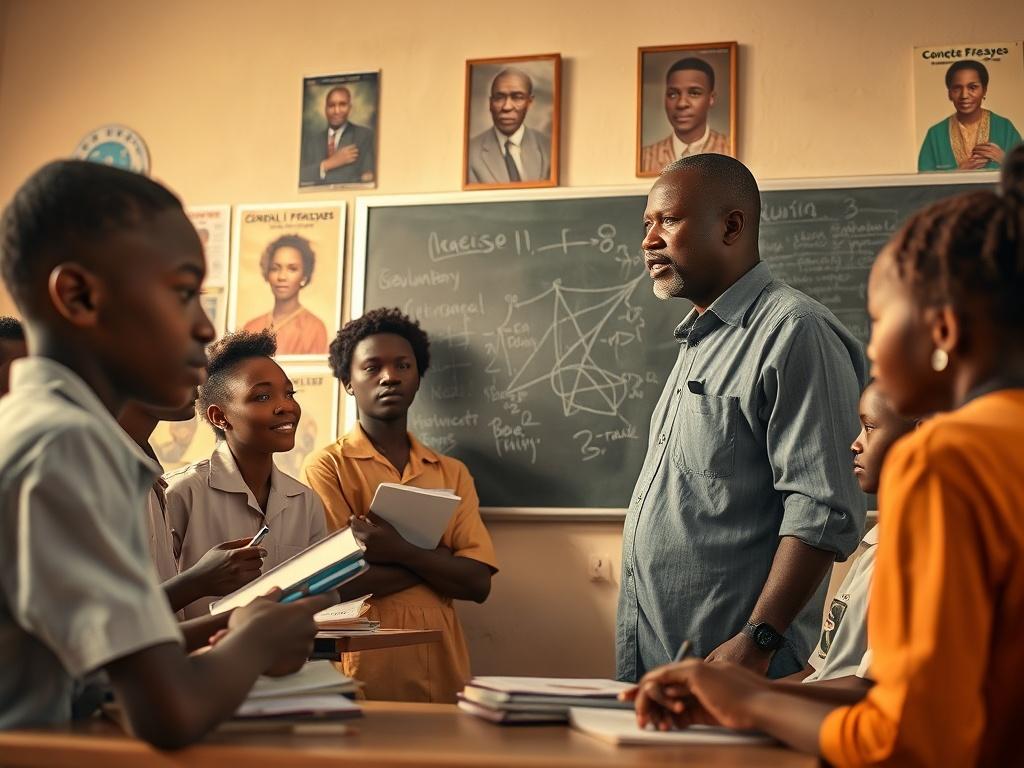Website designed with the B12 website builder. Create your own website today.
Start for free
The Nigeria education system and curriculum play a crucial role in shaping the future of its youth and the nation as a whole. With a rich history influenced by diverse cultures and colonial legacies, the education system encompasses primary, secondary, and tertiary levels, each designed to equip students with essential knowledge and skills. However, as the global landscape evolves, so too must Nigeria's approach to education. This blog post delves into the intricacies of Nigeria’s education system and curriculum, exploring its structure, the evolution of its various levels, and the pressing need to integrate practical teaching methods that bridge the gap between theory and application.
In discussing the curriculum framework, it is essential to consider the historical influences that have shaped Nigeria's educational practices, notably its colonial connections. While the country adopted elements from the British education system, the impacts have been mixed, with the curriculum often criticized for its limited responsiveness to contemporary needs and real-world challenges. As we examine the current state of Nigeria’s education system and the future it holds, we will highlight the potential for transformation through innovative teaching methodologies and relevant curriculum reforms. Join us as we explore the landscape of Nigeria’s education and envision a path forward that equips future generations for success in an ever-changing world.
Understanding the Nigeria education system and curriculum: A comprehensive overview
The Nigeria education system stands as a vital pillar for the nation's development, influencing various sectors of society. Compromised of three main educational levels—primary, secondary, and tertiary—the system is designed to equip students with essential knowledge and skills. The Federal Ministry of Education oversees the national curriculum, which emphasizes not only academic excellence but also moral training and civic responsibility. As a country with a rich and diverse cultural background, Nigeria's curriculum reflects its multifaceted heritage while striving to meet international standards. Yet, despite these efforts, numerous challenges persist, including inadequate funding, infrastructural deficits, and the pressing need for teacher training and capacity development.
In Nigeria, education runs on a formal structure that typically spans 12 years of basic education, followed by higher education opportunities. The primary education system operates for six years, focusing on foundational skills in literacy and numeracy. Following this, secondary education lasts for another six years, providing students with a more comprehensive understanding of a variety of subjects. Nigerian tertiary institutions, including universities, polytechnics, and colleges of education, offer specialized training to prepare students for the workforce. However, despite this well-structured framework, the education system often faces criticism for its heavy reliance on rote learning and theoretical approaches, which can hinder the practical skills necessary for modern-day demands.
The evolution of Nigeria's primary, secondary, and tertiary curriculum systems
The evolution of Nigeria's education system has undergone significant transformations since its inception. Initially, the colonial education system laid the groundwork for the contemporary curriculum, heavily influenced by British educational principles. Following Nigeria's independence in 1960, the government recognized the need to tailor the curriculum to meet the unique cultural, social, and economic needs of the country. This realization led to the introduction of the National Policy on Education (NPE) in 1977, which emphasized the importance of a balanced education that incorporates both academic knowledge and skill development. The primary and secondary school curriculums were subsequently restructured to include indigenous languages, vocational training, and a focus on morality and citizenship.
At the tertiary level, Nigeria's universities and polytechnics offer degree programs that reflect the country's growing demands for skilled professionals. Over the years, various curriculum reviews have aimed to align higher education with global standards while addressing local challenges. However, the integration of practical skills into the curriculum continues to be a concern. Many graduates enter the workforce lacking the hands-on experience necessary for job readiness. As educational stakeholders continue to advocate for a more practical approach, the ongoing evolution of Nigeria's primary, secondary, and tertiary curriculum systems aims to create a more robust education framework that prepares students for the complexities of the modern world.
Bridging the gap: Practical teaching in Nigeria's education system and its future prospects
In Nigeria, the education system often emphasizes theoretical knowledge, leaving a significant gap between what students learn in the classroom and how they can apply this knowledge in real-world scenarios. Many graduates struggle to transition from academic settings to the workforce due to a lack of practical skills and hands-on experience. To address this issue, educational stakeholders are increasingly advocating for the integration of practical teaching methodologies into the curriculum. This shift aims to equip students with skills that align with industry demands, ensuring they are job-ready upon graduation. Institutions are starting to adopt more experiential learning techniques, focusing on workshops, internships, and partnerships with businesses to to create a more holistic educational experience.
Looking ahead, the future of Nigeria's education system holds promise, particularly as the government and educational bodies prioritize reform and modernization. By fostering an environment that values practical teaching alongside theoretical knowledge, the country can enhance its competitive edge on a global scale. Moreover, embracing technology in teaching practices can further bridge the gap between theory and practice, allowing for innovative approaches like virtual simulations and collaborative projects. As Nigeria continues to evolve its education system, it has the potential to produce a generation of graduates who are not only academically proficient but also skilled in applying their knowledge effectively in various sectors.